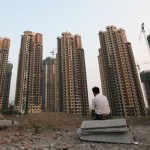China's Real Estate Boom
 The Chinese understandably take pride in their newly gained ability to buy expensive things. But the mania for buying up Hong Kong real estate is not a sign of success -- it's a warning of the likely consequences of China's imperfect transition to First World status.
The Chinese understandably take pride in their newly gained ability to buy expensive things. But the mania for buying up Hong Kong real estate is not a sign of success -- it's a warning of the likely consequences of China's imperfect transition to First World status.
Click here to read all of David Frum's blogposts from China.
Here's an arresting newspaper lead:
Standing in the shouting tumult of a real estate fair, Chen Shiyong said, feels like watching a suicidal man on top of a building ignoring the pleas of bystanders to pull back from the edge.
That's from a Reuters description of the scene at a recent show of model apartments at Beijing's World Trade Center, as printed in the 4/14 issue of the South China Morning Post.
Hong Kongers take a jaundiced view of real estate markets: prices here for everything but the most super-deluxe properties continue to slump well below 1997 peaks. As they watch their Mainland neighbors buy anything and everything with a roof over it, they feel they have seen this bad movie before.
Chinese understandably take pride in their newly gained ability to buy expensive things. Even in sophisticated Hong Kong, people talk with gusto about the prices of everything from watches to tuition at American universities. But the mainland's mania is not a sign of success - it's a warning of the likely consequences of China's imperfect transition from Third World to First World status.
The 4/14 South China Morning Post again reports (in a column I can’t find online) that total bank deposits in China may now equal total deposits in the U.S. Columnist Xavier Wong exults, "Generally speaking, total bank deposits ... provide a good gauge of a country's economic strength." That might be true, if the two countries in question provided equally attractive non-bank stores of wealth. But that precisely is what China does not do. Financial markets are no place for the Chinese small investor, leaving him or her with two alternatives: bank savings and real estate. Hence the accumulation of savings, hence the zooming property market. People are not shopping for places to live; they are shopping for secure and growing stores of wealth. Hong Kongers know how this cycle ends.
A typical urban worker might earn 500 yuan a month, a little under $75 at the current rate of exchange. An apartment near central Beijing can cost 35,000 yuan per square meter, $570 per square foot. That's a heck of a price for what an American would regard as very drab high-rise housing.
Yes there a lot of rich people in China: maybe 600,000 millionaires in U.S. dollar terms. But even in China, there's a limit to everything, including the number of greater fools.